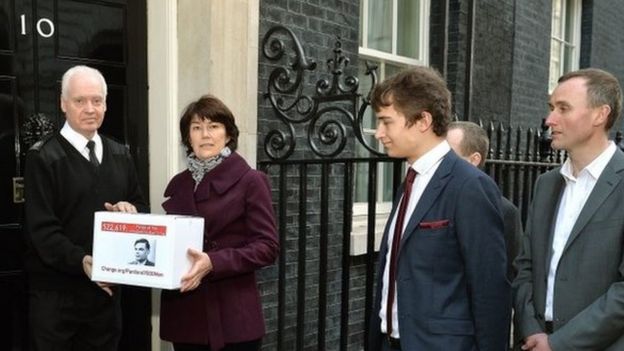UK: Convictions of Gays and Sex Will be Abolished
Thousands of gay and bisexual men convicted of now-abolished sexual offences are to receive posthumous pardons, the government has announced.
It will mean formal pardons for those convicted over consensual same-sex relationships before homosexuality was decriminalised in the UK.
Justice Minister Sam Gyimah said the move was "hugely important".
It honours a government commitment made after World War Two code-breaker Alan Turing was pardoned in 2013.
Under the move - dubbed "Turing law" - deceased people who were convicted of sexual acts that are no longer deemed criminal will receive an automatic pardon.
Anyone living who has been convicted of such offenses can already apply through the Home Office to have their names cleared through a "disregard process", which can remove any mention of an offence from criminal record checks.
Turing Relatives
Turing Relatives
'Hugely important'
However, those still alive will also receive a new, automatic statutory pardon - once their offences have been successfully deleted through the disregard process.
Mr Gyimah said it was "hugely important that we pardon people convicted of historical sexual offences who would be innocent of any crime today".
The Sexual Offences Act decriminalised private homosexual acts between men aged over 21 in England and Wales, in 1967.
The law was not changed in Scotland until 1980, or in Northern Ireland until 1982.
Calls for wider pardons strengthened after Turing was given a posthumous royal pardon in 2013.
The Bletchley Park code-breaker was convicted in 1952 of gross indecency with a 19-year-old man.
He was later chemically castrated and died in 1954 after poisoning himself with cyanide.
His pardon, nearly 60 years later, followed a Private Member's Bill introduced by Lord Sharkey.
The Lib Dem peer said the latest government announcement was "a momentous day for thousands of families up and down the UK".
He said: "It is a wonderful thing that we have been able to build on the pardon granted to Alan Turing during the coalition."
'Unnecessary' distress
However, the government has said it will not be supporting a separate Private Member's Bill on the subject - introduced by SNP MP John Nicolson - which is set to be debated on Friday.
Mr Nicolson, the MP for East Dunbartonshire, has proposed a blanket pardon for those still living, without the need to go through the disregard process.
Mr Gyimah said such a move - without detailed investigations by the Home Office - could see people guilty of offences claiming pardons for acts that are still illegal.
"This would cause an extraordinary and unnecessary amount of distress to victims," he added.
Paul Twocock, from the charity Stonewall, which campaigns for lesbian, gay, bisexual and transgender people, welcomed the announcement but said it supported Mr Nicolson's Private Member's Bill.
Mr Twocock said the bill "explicitly" excluded pardoning anyone convicted of offences that would still be illegal today, including non-consensual sex and sex with someone under 16.


Comments